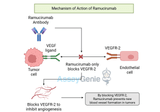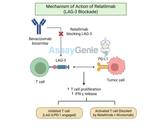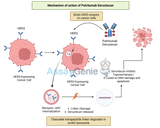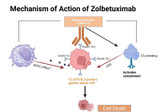Blog
Dupilumab: Transforming Immunotherapy and Skin Disease Management
What You Need to Know About DupilumabWhat is Dupilumab?Dupilumab is a fully human monoclonal antibody designed to treat various chronic inflammatory diseases by inhibiting key cytokines involved in immune responses.How does Dupilumab work?It targets the interleukin-4 (IL-4) receptor α subunit, blocking IL-4 and IL-13 signaling pathways that drive inflammation.What are the clinical applications of Dupilumab?Approved for atopic dermatitis, asthma, chronic rhinosinusitis with nasal polyposis (CRSwNP), and eosinophilic esophagitis (EoE), Dupilumab addresses several unmet medical needs.Is Dupilumab safe?Yes, Dupilumab has a well-established safety profile, with mild injection-site r
…
1st Feb 2025
Inebilizumab: Advancing Research and Clinical Applications
What You Need to Know About InebilizumabWhat is Inebilizumab?Inebilizumab is a humanized monoclonal antibody that targets CD19, a protein expressed on B cells, to treat autoimmune diseases.How does Inebilizumab work?It depletes B cells by binding to CD19, reducing inflammation and modulating immune responses.What are the clinical applications of Inebilizumab?It is primarily approved for treating Neuromyelitis Optica Spectrum Disorder (NMOSD) in adults.Is Inebilizumab safe?Yes, it has demonstrated a favorable safety profile, with common side effects being mild-to-moderate and manageable.1.) Understanding InebilizumabInebilizumab represents a groundbreaking advancement in the tre
…
1st Feb 2025
Naratuximab: Redefining Cancer Therapy with Precision Medicine
Quick Facts About NaratuximabWhat is Naratuximab?Naratuximab is an anti-CD37 monoclonal antibody-drug conjugate (ADC) designed to target B-cell malignancies, particularly non-Hodgkin lymphoma (NHL).How does Naratuximab work?It binds to the CD37 protein on the surface of B cells, delivering a cytotoxic payload to eliminate cancerous cells while sparing healthy ones.What are the clinical uses of Naratuximab?Naratuximab is primarily investigated for treating relapsed or refractory B-cell lymphomas, with promising results in clinical trials.1.) Understanding NaratuximabNaratuximab represents a groundbreaking advancement in antibody-drug conjugate (ADC) therapy, specifically designe
…
1st Feb 2025
Ramucirumab: Mechanism, Clinical Applications, and Biosimilars in Cancer Research
Quick Facts About RamucirumabWhat is Ramucirumab?Ramucirumab is a monoclonal antibody that targets vascular endothelial growth factor receptor 2 (VEGFR-2), inhibiting angiogenesis, a process crucial for tumor growth.How Does Ramucirumab Work?It blocks VEGFR-2 signaling, preventing blood vessel formation that tumors need to grow and spread, making it effective in various cancers.What Are the Clinical Applications of Ramucirumab?It is approved for treating advanced gastric cancer, non-small cell lung cancer (NSCLC), and colorectal cancer, often in combination with chemotherapy.What Are the Side Effects of Ramucirumab?Common side effects include hypertension, proteinuria, fatigue,
…
31st Jan 2025
Cabiralizumab: Unlocking the Potential of Anti-CSF1R Therapy
What You Need to Know About CabiralizumabWhat is Cabiralizumab?Cabiralizumab is a monoclonal antibody targeting the colony-stimulating factor-1 receptor (CSF1R), developed for treating cancer and immune-mediated diseases.What is the mechanism of action for Cabiralizumab?Cabiralizumab works by inhibiting CSF1R signaling, reducing macrophage-mediated immune suppression in tumors and promoting anti-tumor immunity.What are the clinical applications of Cabiralizumab?It is being investigated for its potential in treating pancreatic cancer, tenosynovial giant cell tumor (TGCT), and immune-related diseases like PVNS.1.) Understanding CabiralizumabCabiralizumab (FPA008) is a monoclonal
…
31st Jan 2025
Icatolimab: Revolutionizing the Fight Against Cancer via CD47 Targeting
Quick Facts About IcatolimabWhat is Icatolimab?Icatolimab is a monoclonal antibody designed to target CD47, a protein that cancer cells use to evade immune detection.How does Icatolimab work?By blocking CD47, Icatolimab enables macrophages to recognize and eliminate cancer cells, enhancing the immune system's response.What are the clinical applications of Icatolimab?Icatolimab is primarily investigated for treating hematological malignancies and solid tumors, with promising results in emerging studies.1.) Understanding IcatolimabIcatolimab represents a significant advancement in immuno-oncology, focusing on the immune checkpoint CD47. CD47 functions as a "don’t eat me" signal,
…
31st Jan 2025
Ponsegromab: A Breakthrough in Heart Failure and Cachexia Research
Quick Facts About PonsegromabWhat is Ponsegromab?Ponsegromab is an investigational monoclonal antibody developed by Pfizer, primarily studied for its potential in treating heart failure and cancer-associated cachexia.What is the Mechanism of Action of Ponsegromab?Ponsegromab targets Growth Differentiation Factor 15 (GDF-15), a cytokine linked to inflammation, appetite regulation, and muscle wasting. By inhibiting GDF-15, Ponsegromab aims to counteract cachexia and improve patient outcomes in cardiovascular and cancer-related conditions.What Are the Clinical Applications of Ponsegromab?Ponsegromab is being evaluated for its potential to mitigate muscle wasting in heart failure a
…
29th Jan 2025
Relatlimab: Unlocking the Potential of LAG-3 Inhibition in Cancer Research
Quick Facts About RelatlimabWhat is Relatlimab?Relatlimab is a monoclonal antibody that targets LAG-3 (Lymphocyte Activation Gene-3), a key immune checkpoint involved in T-cell regulation.How Does Relatlimab Work?Relatlimab blocks LAG-3, enhancing T-cell activity and improving immune responses against cancer, particularly when combined with PD-1 inhibitors.What Are the Clinical Applications of Relatlimab?It is primarily used in treating melanoma, especially in combination with nivolumab, for patients with advanced or unresectable tumors. 1.) Understanding RelatlimabRelatlimab is a next-generation immune checkpoint inhibitor that targets Lymphocyte-Activation Gene 3 (LAG-3)
…
29th Jan 2025
Bevacizumab: Mechanism, Clinical Applications, and Biosimilar Insights
Quick Facts About BevacizumabWhat is Bevacizumab?Bevacizumab is a monoclonal antibody that targets vascular endothelial growth factor (VEGF), inhibiting angiogenesis (the formation of new blood vessels) to restrict tumor growth.How does Bevacizumab work?It binds to VEGF, preventing it from interacting with its receptors on endothelial cells, thereby reducing blood supply to tumors and slowing their progression.What are the clinical applications of Bevacizumab?Bevacizumab is used in the treatment of multiple cancers, including colorectal, lung, and ovarian cancers, as well as certain eye conditions such as age-related macular degeneration.What are the common side effects of Beva
…
29th Jan 2025
Patritumab Deruxtecan: Mechanism, Clinical Applications, and Biosimilar Advances
Quick Facts About Patritumab DeruxtecanWhat is Patritumab Deruxtecan?Patritumab Deruxtecan (HER3-DXd) is an investigational antibody-drug conjugate (ADC) targeting HER3, a receptor implicated in various cancers, including non-small cell lung cancer (NSCLC) and breast cancer.How Does Patritumab Deruxtecan Work?This ADC binds to HER3-expressing tumor cells, delivering a topoisomerase I inhibitor payload that induces targeted cell death.What Are the Clinical Applications of Patritumab Deruxtecan?Emerging research explores its efficacy in NSCLC, breast cancer, and other HER3-expressing malignancies. Recent trials focus on its potential in overcoming resistance to standard therapies
…
29th Jan 2025
Ruplizumab: Unveiling the Role of Anti-CD47 in Cancer Research
Quick Facts About RuplizumabWhat is Ruplizumab?Ruplizumab is an investigational monoclonal antibody designed to target CD47, a protein that helps cancer cells evade immune detection.What is the mechanism of action for Ruplizumab?Ruplizumab works by inhibiting the interaction between CD47 and its receptor, SIRPα, thereby enabling immune cells to recognize and attack tumor cells more effectively.What are the clinical applications of Ruplizumab?Ruplizumab is being studied primarily for its role in treating various cancers, including hematologic and solid tumors, through its immune-modulating effects.1.) Understanding RuplizumabRuplizumab is an investigational monoclonal antibody e
…
29th Jan 2025
Brodalumab: A Breakthrough in IL-17 Receptor Blockade for Psoriasis and Beyond
Quick Facts About BrodalumabWhat is Brodalumab?Brodalumab is a monoclonal antibody that targets the IL-17 receptor to treat immune-mediated conditions like moderate-to-severe plaque psoriasis.What is the mechanism of action of Brodalumab?It blocks IL-17 receptor A, inhibiting downstream signaling pathways involved in inflammatory responses.What conditions does Brodalumab treat?Brodalumab is approved for psoriasis, psoriatic arthritis, and is being studied for other autoimmune disorders.Is Brodalumab safe?While generally well-tolerated, it carries a REMS program due to risks of suicidal ideation in some patients. Always consult healthcare professionals for guidance.1.) Understan
…
29th Jan 2025
Adalimumab: Mechanism, Clinical Applications, and the Role of Biosimilars
Quick Facts About AdalimumabWhat is Adalimumab?Adalimumab is a fully human monoclonal antibody designed to neutralize tumor necrosis factor-alpha (TNF-α), a key cytokine involved in inflammation.How does Adalimumab work?Adalimumab binds to TNF-α, preventing its interaction with receptors, thereby reducing inflammation and improving autoimmune disease management.What conditions does Adalimumab treat?Adalimumab is used to treat rheumatoid arthritis, psoriatic arthritis, Crohn’s disease, ulcerative colitis, plaque psoriasis, and ankylosing spondylitis.Is Adalimumab safe?Adalimumab has a well-documented safety profile but may cause side effects such as infections, injection site re
…
29th Jan 2025
Cetuximab: A Revolutionary Drug in Cancer Therapy
Quick Facts About CetuximabWhat is Cetuximab?Cetuximab is a monoclonal antibody targeting the epidermal growth factor receptor (EGFR), widely used in cancer therapy.How does Cetuximab work?Cetuximab binds to EGFR on cancer cells, inhibiting cell proliferation and inducing apoptosis, making it a powerful tool in oncology.What are the clinical uses of Cetuximab?It is commonly prescribed for metastatic colorectal cancer and squamous cell carcinoma of the head and neck, often in combination with chemotherapy or radiation.Is Cetuximab safe?Cetuximab is generally well-tolerated, but common side effects include skin rash and infusion reactions.1.) Understanding CetuximabCetuximab, a c
…
29th Jan 2025
Utomilumab: Advancing Immuno-Oncology Research
Quick Facts About UtomilumabWhat is Utomilumab?Utomilumab is a monoclonal antibody targeting 4-1BB (CD137), a co-stimulatory receptor on T-cells, designed to enhance anti-tumor immunity.What is the mechanism of action for Utomilumab?Utomilumab binds to 4-1BB, stimulating T-cell activation and proliferation while promoting an enhanced immune response against cancer cells.What are the clinical applications of Utomilumab?It has been investigated in combination therapies for cancers such as non-small cell lung cancer (NSCLC) and melanoma, aiming to improve immune checkpoint therapy outcomes.1.) Understanding UtomilumabUtomilumab represents a pivotal development in immuno-oncology a
…
29th Jan 2025
Bersanlimab: Revolutionizing Cancer Research with Anti-CD47 Therapeutics
What You Need to Know About BersanlimabWhat is Bersanlimab?Bersanlimab is a cutting-edge anti-CD47 monoclonal antibody designed to disrupt cancer cells' evasion of immune detection.What role does Bersanlimab play in targeting CD47?It inhibits CD47—a “do not eat me” signal used by cancer cells—to enhance macrophage-mediated phagocytosis and immune response.What are the clinical applications of Bersanlimab?Bersanlimab is under investigation for treating hematologic malignancies and solid tumors by restoring the immune system’s ability to fight cancer effectively.1.) Understanding BersanlimabBersanlimab represents a significant advancement in immuno-oncology, specifically within t
…
29th Jan 2025
Labetuzumab: Revolutionizing Cancer Research with Targeted Therapies
Quick Facts About LabetuzumabWhat is Labetuzumab?Labetuzumab is a monoclonal antibody targeting CEACAM5, a protein overexpressed in various cancers, primarily colorectal carcinoma.How does Labetuzumab work?By binding to CEACAM5, Labetuzumab delivers cytotoxic agents directly to cancer cells, minimizing damage to healthy tissue.What are its clinical applications?Labetuzumab is primarily used in cancer treatment research, including colorectal cancer and other CEACAM5-positive malignancies.Is Labetuzumab discontinued?Some variants, like Labetuzumab govitecan, have been discontinued, but they remain vital in understanding targeted drug design.1.) Understanding LabetuzumabLabetuzuma
…
29th Jan 2025
Enapotamab: Advancing Cancer Research with Innovative Therapeutics
Quick Facts About EnapotamabWhat is Enapotamab?Enapotamab is an experimental antibody-drug conjugate (ADC) developed to target tumor cells selectively, offering new hope in cancer treatment.How does Enapotamab work?Enapotamab combines a monoclonal antibody with a cytotoxic agent to selectively bind to tumor-associated antigens, delivering a potent anti-cancer payload directly to cancer cells.What are the clinical applications of Enapotamab?This ADC has shown potential in treating solid tumors such as non-small cell lung cancer (NSCLC), melanoma, and head-and-neck cancers.1.) Understanding EnapotamabEnapotamab vedotin represents a groundbreaking advance in oncology therapeutics
…
29th Jan 2025
Fezakinumab: Exploring Its Mechanism and Clinical Potential
Quick Facts About FezakinumabWhat is Fezakinumab?Fezakinumab is a human IgG1-lambda monoclonal antibody that targets interleukin-22 (IL-22), a cytokine involved in inflammatory responses. What is the mechanism of action for Fezakinumab?By binding to IL-22, Fezakinumab inhibits its activity, thereby reducing inflammation associated with various diseases. What are the clinical applications of Fezakinumab?Fezakinumab has been investigated in clinical trials for conditions such as atopic dermatitis and rheumatoid arthritis. 1.) Understanding FezakinumabThe development of Fezakinumab was initiated by Wyeth Pharmaceuticals and later continued by Pfizer following their
…
29th Jan 2025
Ianalumab: Exploring Its Mechanism, Clinical Applications, and Research Potential
Quick Facts About IanalumabWhat is Ianalumab?Ianalumab is a monoclonal antibody currently being investigated for its potential in treating autoimmune diseases, particularly lupus and immune thrombocytopenia (ITP). It is developed to target and inhibit B-cell activation, a critical mechanism in autoimmune responses.What is the mechanism of action for Ianalumab?Ianalumab works by targeting and inhibiting the B-lymphocyte stimulator (BLyS), which is essential for the survival and activation of B cells. By blocking BLyS, it reduces the number of autoreactive B cells responsible for autoimmune damage.What are the clinical applications of Ianalumab?Ianalumab has shown promise in trea
…
28th Jan 2025
Belimumab: Unveiling Its Role in Lupus and Beyond
Quick Facts About BelimumabWhat is Belimumab?Belimumab is a monoclonal antibody used to treat systemic lupus erythematosus (SLE), an autoimmune disease. It is marketed under the brand name Benlysta.What is the mechanism of action for Belimumab?Belimumab works by inhibiting the B-lymphocyte stimulator (BLyS), a protein that plays a central role in the survival and activity of B cells, which are involved in autoimmune responses.What are the clinical applications of Belimumab?Belimumab is primarily used to treat lupus, including lupus nephritis, by reducing disease activity and flares in patients with systemic lupus erythematosus.1.) Understanding BelimumabBelimumab, sold under th
…
28th Jan 2025
Onvatilimab: Redefining the Role of Anti-CD47 in Cancer Research
Quick Facts About OnvatilimabWhat is Onvatilimab?Onvatilimab is a monoclonal antibody targeting CD47, often referred to as the "don't eat me" signal, which is overexpressed on many cancer cells.What role does Onvatilimab play in targeting CD47?By blocking CD47, Onvatilimab enables macrophages and the immune system to recognize and eliminate cancer cells effectively.Is Onvatilimab safe?Ongoing clinical trials indicate a promising safety profile, but research is still exploring long-term effects and combination therapies.1.) Understanding OnvatilimabOnvatilimab represents a groundbreaking advancement in the field of immuno-oncology, offering a promising therapeutic strategy for c
…
27th Jan 2025
Zolbetuximab: A Breakthrough in Targeting Claudin 18.2 for Cancer Treatment
Quick Facts About ZolbetuximabWhat is Zolbetuximab?Zolbetuximab is a monoclonal antibody that targets Claudin 18.2, a protein overexpressed in gastric and pancreatic cancers, enhancing targeted therapy.What is the mechanism of action for Zolbetuximab?It binds to Claudin 18.2, triggering antibody-dependent cellular cytotoxicity (ADCC) and complement-dependent cytotoxicity (CDC), leading to tumor cell death.What are the clinical applications of Zolbetuximab?It is being investigated for treating gastric and pancreatic cancers, particularly in patients with high Claudin 18.2 expression.1.) Understanding ZolbetuximabZolbetuximab is an investigational monoclonal antibody developed by
…
27th Jan 2025
Tigatuzumab: Advancing Cancer Research with Targeted Therapies
Quick Facts About TigatuzumabWhat is Tigatuzumab?Tigatuzumab is a monoclonal antibody that targets the death receptor 5 (DR5) pathway, inducing apoptosis in cancer cells.What is the mechanism of action for Tigatuzumab?Tigatuzumab binds to DR5, activating apoptotic pathways in cancer cells, making it a targeted therapy for solid tumors and hematological malignancies.What are the clinical applications of Tigatuzumab?Tigatuzumab has been investigated for treating various cancers, including non-small cell lung cancer and pancreatic cancer. Emerging research highlights its potential in combination therapies.1.) Understanding MagrolimabTigatuzumab, a fully humanized monoclonal antibo
…
23rd Jan 2025
























